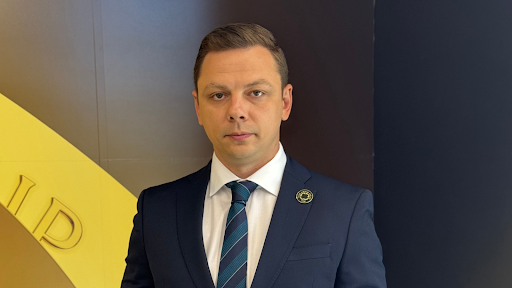What It Takes to Run the World's Biggest Sporting Event — According to Ivan Marchenko

The 2026 FIFA World Cup will take place in 16 stadiums across the United States, Canada, and Mexico, making it the largest single-sport tournament ever staged. As venue operations director, Ivan Marchenko leads FIFA's most complex planning effort and draws on more than 15 years of hands-on experience in global tournament logistics.
While the Summer Olympics typically involve around 10,000 athletes competing in over 30 sports within one host city, the 2026 World Cup will span three countries, 16 cities, and 104 matches over five weeks. The tournament will host 48 national teams and is expected to draw over 3 million in-person spectators, with millions more involved through staffing, volunteers, and travel-related activity. Coordinating security, transport, accommodation, and match operations at this scale requires a decentralized infrastructure far broader than any other major event.
Global Experience and Operational Growth
Ivan began his career in 2009, helping organize the opening ceremony at Donbas Arena in Donetsk, Ukraine. That event included a performance by Beyoncé and introduced him to the challenges of large-scale live productions. He later served as an assistant venue manager at UEFA Euro 2012, gaining experience coordinating venue logistics at a continental level.
By 2018, Marchenko had advanced to managing Yekaterinburg Stadium during the FIFA World Cup in Russia. In this role, he led local operations teams under strict timelines and ensured compliance with FIFA protocols.
His time in Qatar was his longest and wide-ranging. Over 11 years, he played a central role in preparing all eight tournament stadiums for the 2022 FIFA World Cup. His duties spanned the full lifecycle of venue development—from early-stage planning to match-day delivery. The Argentina vs. France final marked one of his most memorable moments, reinforcing his experience handling global events.
Leadership Framework Built on Three Priorities
Across more than a decade of stadium operations, Ivan has developed a leadership approach grounded in operational clarity, cross-functional coordination, and local team empowerment.
He emphasizes clarity in preparation. Under his oversight, each stadium operates with a plan tailored to its location, expected risks, and regional systems. Whether dealing with extreme weather in Dallas or managing crowd flow in Mexico City, his teams rely on practical scenario-based frameworks.
He also prioritizes coordination between operational departments. Security, guest services, broadcast media, and sustainability teams must work together. Ensuring they align by setting shared goals and maintaining consistent communication.
Marchenko leads a team of venue operations directors across all 16 stadiums. He gives them a consistent planning structure while allowing space for local adaptation. His approach enables stadium teams to deliver events that meet both FIFA requirements and regional expectations.
Applying the Model Across North America
The 2026 FIFA World Cup is the largest in history, with 48 teams and 104 matches across three countries. Ivan Marchenko leads the planning and delivery of venue operations across this vast geography. He is also overseeing the venue management for the 2025 FIFA Club World Cup, across 12 stadiums in the United States. The event includes 32 teams and 63 matches.
"You need precision, trust, and constant motion," says Ivan Marchenko. "Every city and partner moves in sync. We build systems that keep matches on time and teams supported. That is how you run something this big."
Some venues, such as AT&T Stadium in Dallas, are deploying advanced ticketing and crowd analytics software. Others, like Estadio Azteca in Mexico City, receive targeted retrofits to meet safety and accessibility standards. The Venue Management team has to adapt and upgrade plans based on venue conditions, ensuring that each stadium delivers a consistent tournament experience.
Marchenko introduced structured planning frameworks to address differences in stadium infrastructure and operations across North America. These systems allow each venue to meet FIFA standards while accounting for local practices and regulatory conditions.
Legacy and Industry Influence
Having led operations for the smallest and largest World Cups ever staged, Marchenko brings unique insight into scaling venue strategies for different tournament models.
He also mentors early-career operations professionals and shares planning models with emerging markets.
"This industry kind of chose me," reflects Marchenko. "I started organizing events during university, and it just took off from there. Nothing is more meaningful than watching a stadium come to life."
Marchenko's work on the 2026 FIFA World Cup reflects a career built on precision, collaboration, and adaptable planning. Other host cities preparing to stage large-scale international events now reference his strategy.
© Copyright IBTimes 2025. All rights reserved.





















